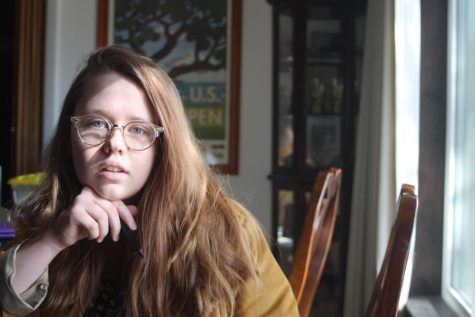‘The Half of It’ triumphs with funny, unconventional love story
May 2, 2020
In the sleepy town of Squahamish, WA, the local high school is awash with incompetent writers.
Where a cynical English teacher (Becky Ann Baker) sees a travesty, the silver-tongued Ellie Chu (Leah Lewis) sees an opportunity: her opening lines in the Netflix original film seem at first the wise inner reflections of a thoughtful soul, only for the truth to come to light.
“And that, my friends,” Ellie says as the paper leaves the printer, and another name is checked off her tidy list, “is some A-plus love philosophy.”
It’s an essay-for-hire.
The scene that follows is one of the cleverest and cheekiest in all of teen cinema. Ellie, sitting behind a piano in the music room, discreetly distributes the fruit of her scheme among generously paying clients, and all the while, the film’s director, Alice Wu, is secretly orchestrating chaos under all our noses. In her fresh and delightful take on the romantic comedy, there is not one meet-cute in the first ten minutes, but two.
Aster Flores (Alexxis Lemire), the bookish, subdued pastor’s daughter, becomes the apex of a love triangle, and is none the wiser about it: Ellie falls quickly, disastrously in love with her, and hardly a few strides away, Paul Munsky (Daniel Diemer), a star football player with a penchant for surprising food combinations, does the same.
Ellie’s solution? Bury it and occupy her thoughts elsewhere. Paul’s? Hire Ellie to write a killer love letter, and win Aster’s heart.
After this comes a torrent of longing, wry comedy, and edge-of-your-seat suspense, where Alice Wu has you wondering if every stunt is the one that finally exposes them both, if Ellie is ever going to admit her crush, if Aster might feel the same way, and on, and on, and on.
Wu’s filmmaking has a bit of a similar quirky, eclectic energy to Susan Johnson’s “To All The Boys I’ve Loved Before” in the same charming, stylized romp fashion, but ultimately she marries a swift, tongue-in-cheek style to a calmer, gentler approach, lending her characters more room to breathe––while also never entirely guaranteeing that they won’t fall prey to her wit when the time is ripe.
“The Half of It” is, indeed, hysterical. Half of the time, it’s because Wu’s script draws attention to some mundane absurdity, and the other half, it’s because the fake love letters and disguised text messages and dates reach such a screeching height of awkwardness that it’s too painful to do anything but laugh.
If there’s anything this film undeniably exceeds at, it’s this very deep pang of secondhand embarrassment that works on the surface because it’s so well-timed, but also scratches at a much deeper place by virtue of its slow-to-bloom but vibrantly lovable characters, on whose behalf you might find yourself squirming and shying away from the screen. But be advised: those pauses-to-recuperate add to the run time.
The secret to Wu’s characters and their boundless magnetism lies in distinctive dialogue and lovingly-crafted aspirations, but they’re also fleshed out with a close attention to detail, and a keen understanding of the high school experience, and what relationships truly define it.
“The Half of It” is more than a romantic comedy with a few obstacles in between a would-be couple; it chooses instead to value often-overlooked friendship just as highly, and develop it with comparable richness. This, barring the generous literary name-dropping and the lovely use of art, is what truly sets the film apart: it isn’t about being in love the way most teen movies are about being in love––it’s about passing through life at someone’s side, learning and valuing what they value, connecting with an experience broader than one’s own.
As an ironic consequence, the film has more to say about love than a love story. As both of Aster’s admirers see hints of a budding romance with her in vastly different ways, the echo of pretense has its contrast in the platonic relationship at the film’s heart. It works so well and lands so beautifully precisely because the story doesn’t owe its structure or integrity to romance.
Rest assured, though––this one can still make your heart ache. Just, perhaps, for reasons you might not expect.

